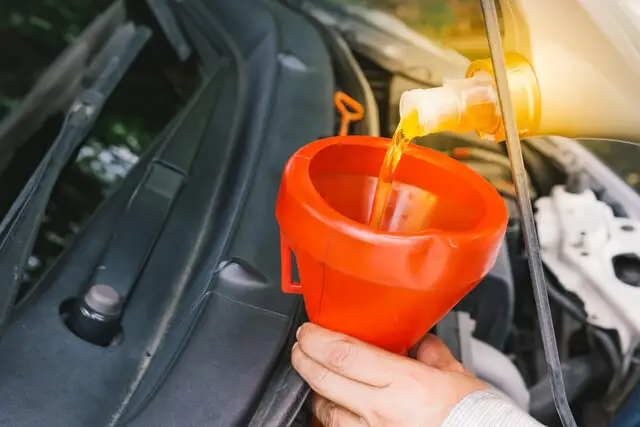Your outboard provides power to your boat that, in turn, helps you in your adventurous activities. If the outboard motor works fine, your boat will also run fine. On the other hand, if you ignore its care, it will not prove supportive and may deceive you in the deep waters. So, looking after your boat’s engine is necessary to confirm security during the water adventures. Along with other maintenance needs, the right oil choice is also necessary. Besides improving the boat’s overall performance, it also adds to its life. Most people get confused over ‘ Can you use car oil in 4 stroke outboard?
It’s necessary to dig for this query as oil quality decides the performance and lifespan of the engine. If the boat engine components get enough oil for lubrication, they will perform better and vice versa. In the later section, we’ll discuss the lubrication requirements of 2 stroke and 4 stroke engines, which oil is good for outboards, and all the other facts related to this query. So, let’s move on to explore this precise guide.
Is It Right to Use Car Oil in 4 Stroke Outboard?

One may wonder that the outboard and the automobile engine perform the same function, so their oils are also interchangeable. This is not right to say as the lubricant requirements of an automobile or simply a car differ from that of an outboard. This is why it’s not wise to use the car coil for a 4 stroke outboard. Here are some major reasons that justify never using automobile engine oil for your boat engine.
Water Corrosion
As the boat engine will have to operate in the water, water corrosion affects it badly. That’s why one should never ignore this outboard aspect while choosing the right oil for it. The lubricants made for automobiles don’t offer much resistance against water corrosion. So, it will not be good for marine engines due to their inefficiencies.
Anti-wear Protection
You may know that the working speed of marine engines is far more than the car engine. So, they need better lubrication than automobiles. The automobile oil fails to provide enough security and protection when it comes to the outboard. Moreover, the boat engines can remain unused for a long time, affecting their lives. However, if you use a good oil for them, they will work appropriately even after many weeks.
Your automobile oil does not offer enough anti-wear protection required to maintain the performance of a boat engine. So, avoid using it for outboards. Rather go for the National Marine Manufacturers Association’s (NMMA) recommended oils for your outboards.
NMMA Recommended Oils for Outboards

As mentioned above, it’s good to use National Marine Manufacturers Association’s recommended oils in your outboards. These oils will improve the performance of the engine as well as they will also make it highly durable. However, NMMA recommends different oils for a 2 stroke boat engine and a 4 stroke. So, it’s good to learn the lubrication requirements of both these types of engines.
2-Stroke Outboard
Two major types of engines are currently common in the market, i.e. two-stroke and four-stroke. Though most new outboards feature a four-stroke engine, two-stroke engines have also ruled the field.
The oil and fuel mix up in these outboards to generate both power and lubrication. As a two-stroke engine lacks a special lubrication source, they tend to wear out quickly and need more lubricant than a four-stroke engine.
4-Stroke Outboard
All the new outboards come with a 4-stroke engine with a specialized lubrication system. A four-stroke engine features a lubrication system held in the oil pump. From there, the engine gets oil via a pressure or splash system. Splash and pressurized lubrication systems use two different methods.
- A pressurized lubrication system has an oil pump that throws the oil via a pressure film on the engine’s moving parts. Along with the other moving parts, this lubrication system also oils the valves and rocker arms of the engine. This is a dedicated lubrication system, so it oils all engine parts well.
- A splash oiling system operates on the base of the momentum of the crankshaft. This momentum lubricates all the engine’s moving components like cam cylinder, lobes, and all others.
- Four-stroke engine has a specialized lubrication system that oils all the engine parts well. So, it features relatively low vibration of the engine that adds to the engine’s life. Moreover, it has an increased anti-wear protection system and protects the outboards against water corrosion.
Here are some NMMA recommended oils that are the best for marine engines.
For 2 Stroke Marine Engines
The NMMA recommends TC-W 3 oils for 2 stroke marine engines. This kind of oil will help a two-stroke boat engine perform very well. However, if you use it in a 4 stroke engine, it may fail to perform properly.
For 4-stroke Marine Engines
A 4-stroke engine needs a different oil to run well than a 2 stroke. So, NMMA recommends different oils for both these kinds of outboards. If you’re going to use the oil in a 4 stroke engine without an exhaust, FC-W is the best choice for you. On the other hand, if you’re going to use this oil for an outboard featuring an exhaust, FC-W catalyst oil is the best one.
Conclusion
Some people think that the automobile engine oil and an outboard have the same function, so one can use them interchangeably. This is not a good practice as the automobile or car engine has low corrosion effects and wear damage. So, car oil is made by taking care of these factors. When one uses this lubricant in his outboard, it may damage it due to high water corrosion. So, always use the NMMA recommended oils for your outboards.

James Carter is an automotive blogger, reviewer, and technology enthusiast based in the USA. With a deep passion for cars and years of experience following the automotive industry, James focuses on delivering honest, well-researched content that helps readers make smarter decisions.

